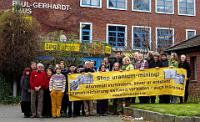Münster, Germany, 30 November 2014 - - At a two-day meeting here around 50 anti-nuclear activists from Russia, France, The Netherlands and from across Germany demanded an immediate end to the countless transports of uranium which ensure nuclear operations in Europe and elsewhere round the world. They also demanded an end to uranium mining and processing everywhere. They demanded that the German government close down uranium enrichment in Gronau and production of nuclear fuel in Lingen. Both factories are not included in the shutdown of nuclear power production planned for Germany and supply power stations around the world.
Hier klicken fuer die deutsche Quelle
The conference participants intensively discussed the considerable dangers created by the mostly secret uranium transports.
They tracked them from mining in Kazakhstan and Uzbekistan through Russia across the Baltic Sea through the Kiel Canal to the central uranium transportation hub in the port of Hamburg.
From there the uranium concentrate rolls by train through Lower Saxony, Bremen, North-Rhine Westphalia and the Mosel/Saar region for processing in Narbonne-Malvési and Pierrelatte in southern France.
As uranium hexafluoride it then moves back to Germany for enrichment in Gronau or not far into The Netherlands at the same kind of plant at Almelo.
The next step is the Areva fuel production in Lingen, before the final products often move again through Hamburg or also Rotterdem to all over the world.
The conference condemned as unacceptable that in many ways France, Germany, Russia and The Netherlands continue to enable a future for the nuclear industry.
The activists also demand determined action from the German state governments to stop the growing number of uranium transports which endanger countless people.
Criticised especially for their inaction were the governments of Hamburg, Lower Saxony and North-Rhine Westphalia. Affected local governments were also called on to proactively campaign against secret uranium transports.
The conference welcomed the many protests against the transports this year, which included a summer camp in Kiel as well as hours-long blockades of transports in Hamburg and the fuel factory in Lingen. There were also protests among others in Gronau, Osnabrück, Münster, Cologne, and Trier.
The participants also criticised that for the uranium waste aggregating worldwide – like all other nuclear waste – there is no safe final disposal.
Already in the mining countries massive amounts of uranium waste aggregate.
For Gronau there are plans to start operating a huge new uranium waste dump for 60,000 tonnes of uranium oxide next year, without a time limit. Participants especially rejected this endless storage in Gronau.
The planned sale of the uranium enricher Urenco on the world market is irresponsible because uranium enrichment is the easiest path to the atom bomb. Only the immediate ending of uranium enrichment is acceptable.
Up to 2009 27,000 tonnes of uranium waste went from Gronau to Russia. The transportation was illegal. In 2006 Russian environment activists filed a criminal suit against the Gronau operator.
Only a few weeks ago the German government admitted reluctantly that it really was nuclear waste that went to Russia, not “valuable recyclable material” as claimed by Urenco. So far the German government refuses to take any responsibility for the German waste dumped in Russia.
A Russian female activist from Ekaterinburg revealed to the conference that they would again ask the public prosecutor in Münster to investigate the illegal waste transport from Gronau to Russia.
The participants sharply condemned attempts by the Russian government through repressive laws to brand Russian environment and human rights organisations as “foreign agents”. The Ecodefense group is currently under threat of enforced disbandment.
The conference demanded respect for the very committed work of the non-governmental organisations and to protect them. It called for solidarity with Ecodefense.
The conference ended on 30 November with protests outside the Gronau and Lingen plants.
In Lingen a woman representing the French anti-nuclear umbrella organisation, Réseau “Sortir du nucléaire” called for immediate closure of the Areva fuel factory. Areva is a globally operating French corporation.
Areva currently has big financial problems and the Lingen operations had to be downsized some weeks ago because of serious technical problems.
The activists announced more joint protects against uranium transportation and the uranium industry as a whole.
More information in German at www.urantransport.de,
www.sofa-ms.de, www.robinwood.de, www.wise-uranium.org,
www.umweltfairaendern.de
Pictures of the conference at http://www.anti-atom-aktuell.de/fotos/20141129-internationales-urantransporte-treffen/
See also The filthy tricks
behind splitting German nuclear power producer, scroll down to "Comments".


Other nuclear news
Total safety an illusion for Japan's nuclear restart
Canadian Inuit say 'No' to uranium mining
6 workers inhaled uranium at Wyoming mine
US nuclear plants squeezed by cheap gas, uranium costs